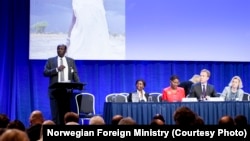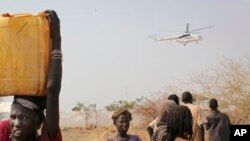OSLO —
U.S. Special Envoy to South Sudan and Sudan Donald Booth has called on South Sudan's leaders to honor promises they made at a donor conference in Norway where the international community pledged more than $600 million for relief efforts in the country.
“We need to hold the leadership to the agreements that they have signed. It’s important for the people of South Sudan that the fighting stop so that, not only can humanitarian aid come through, but so that they can begin to address the political issues underlying the conflict so that those talks can proceed," Booth said in a speech to close the conference.
The U.S. special envoy also repeated a call made last week by a top State Department official for regional troops to be deployed in South Sudan to help protect teams that will monitor a cessation of hostilities agreement and ensure that the aid workers have unimpeded access to people in need.
Booth said "there will be consequences" for anyone who obstructs the delivery of humanitarian assistance or violates the cessation of hostilities agreement, which was first signed in late January and recommitted to by both sides early this month.
Officials with the Intergovernmental Authority on Development (IGAD), a regional body that is providing the monitors and has mediated peace talks for South Sudan, say the full deployment of ceasefire verification teams has been delayed as they wait for a regional protection force to be sent to South Sudan.
South Sudanese Foreign Affairs Minister Barnaba Marial Benjamin said the government will be true to its word and honor the commitments it has made.
“The government and the President of the Republic are on record that they will be given an easy access for delivery of food," he said.
"You also know there is fighting in the area and these agencies, their security is important, so they need to coordinate with the government so that they are warned ahead of time, so they don’t go in areas where they might meet some instability,” he said.
Opposition officials were not available for comment after Booth’s speech, but said earlier in the conference that they were also committed to helping aid agenceis get food and relief supplies to as many people as possible.
The United Nations has said 1.3 million people have been displaced by the conflict in South Sudan and some four million, or around a third of the population, face food insecurity.
The United Nations' Children's Fund (UNICEF) has warned that 50,000 children in the country could die of famine unless the fighting stops and aid workers can reach people in need.
Officials at the two-day conference in Oslo warned that without peace, any monies pledged to South Sudan would be useless.
After announcing that the European Commission was pledging 55 million euros to South Sudan, European Commissioner for Humanitarian Aid Kristalina Georgieva warned, "This money will mean nothing, nothing, to the children, the women, the handicapped who are desperate for help, if there is no access."
"We can bring the billions of this planet, but if there is no access to help people, it means nothing," she said.
The U.N. humanitarian coordinator in South Sudan, Toby Lanzer, welcomed the pledges made at the conference by the government of South Sudan to respect the cessation of hostilities deal and allow aid to get through to the millions around the country who need it.
But, he said, the reality was different to the promises made in speeches.
"There are still 80 checkpoints between Juba and Bentiu. Please fix it," he said.
“We need to hold the leadership to the agreements that they have signed. It’s important for the people of South Sudan that the fighting stop so that, not only can humanitarian aid come through, but so that they can begin to address the political issues underlying the conflict so that those talks can proceed," Booth said in a speech to close the conference.
The U.S. special envoy also repeated a call made last week by a top State Department official for regional troops to be deployed in South Sudan to help protect teams that will monitor a cessation of hostilities agreement and ensure that the aid workers have unimpeded access to people in need.
It’s important for the people of South Sudan that the fighting stop so that, not only can humanitarian aid come through, but they can begin to address the political issues underlying the conflict...Donald Booth, US Special Envoy to South Sudan and Sudan
Booth said "there will be consequences" for anyone who obstructs the delivery of humanitarian assistance or violates the cessation of hostilities agreement, which was first signed in late January and recommitted to by both sides early this month.
Officials with the Intergovernmental Authority on Development (IGAD), a regional body that is providing the monitors and has mediated peace talks for South Sudan, say the full deployment of ceasefire verification teams has been delayed as they wait for a regional protection force to be sent to South Sudan.
South Sudanese Foreign Affairs Minister Barnaba Marial Benjamin said the government will be true to its word and honor the commitments it has made.
“The government and the President of the Republic are on record that they will be given an easy access for delivery of food," he said.
"You also know there is fighting in the area and these agencies, their security is important, so they need to coordinate with the government so that they are warned ahead of time, so they don’t go in areas where they might meet some instability,” he said.
Opposition officials were not available for comment after Booth’s speech, but said earlier in the conference that they were also committed to helping aid agenceis get food and relief supplies to as many people as possible.
The United Nations has said 1.3 million people have been displaced by the conflict in South Sudan and some four million, or around a third of the population, face food insecurity.
The United Nations' Children's Fund (UNICEF) has warned that 50,000 children in the country could die of famine unless the fighting stops and aid workers can reach people in need.
Without peace, aid funds will serve no use
Officials at the two-day conference in Oslo warned that without peace, any monies pledged to South Sudan would be useless.
We can bring the billions of this planet, but if there is no access to help people, it means nothing.European Commissioner for Humanitarian Aid, Kristalina Georgieva
After announcing that the European Commission was pledging 55 million euros to South Sudan, European Commissioner for Humanitarian Aid Kristalina Georgieva warned, "This money will mean nothing, nothing, to the children, the women, the handicapped who are desperate for help, if there is no access."
"We can bring the billions of this planet, but if there is no access to help people, it means nothing," she said.
The U.N. humanitarian coordinator in South Sudan, Toby Lanzer, welcomed the pledges made at the conference by the government of South Sudan to respect the cessation of hostilities deal and allow aid to get through to the millions around the country who need it.
But, he said, the reality was different to the promises made in speeches.
"There are still 80 checkpoints between Juba and Bentiu. Please fix it," he said.






